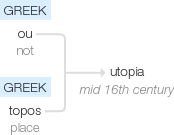Utopia
mid 16th century: based on Greek ou ‘not’ + topos ‘place’; the word was first used in the book Utopia (1516) by Sir Thomas More.
wiktionary
From New Latin Ūtopia, the name of a fictional island possessing a seemingly perfect socio-politico-legal system in the book Utopia (1516) by Sir Thomas More. Coined from Ancient Greek οὐ(ou, “not”) + τόπος(tópos, “place, region”) + -ία(-ía). [1] Compare English topos and -ia.
etymonline
utopia (n.)
1551, from Modern Latin Utopia, literally "nowhere," coined by Thomas More (and used as title of his book, 1516, about an imaginary island enjoying the utmost perfection in legal, social, and political systems), from Greek ou "not" + topos "place" (see topos). The current (since c. 1960) explanation of Greek ou "not" is an odd one, as it derives the word from the PIE root *aiw- "vital force, life; long life, eternity." Linguists presume a pre-Greek phrase *(ne) hoiu (kwid) "(not on your) life," with ne "not" + *kwid, an "emphasizing particle" [Watkins]. The same pattern is found elsewhere.
Extended to any perfect place by 1610s. Commonly, but incorrectly, taken as from Greek eu- "good" (see eu-) an error reinforced by the introduction of dystopia (by 1844). On the same model, Bentham had cacotopia (1818).
